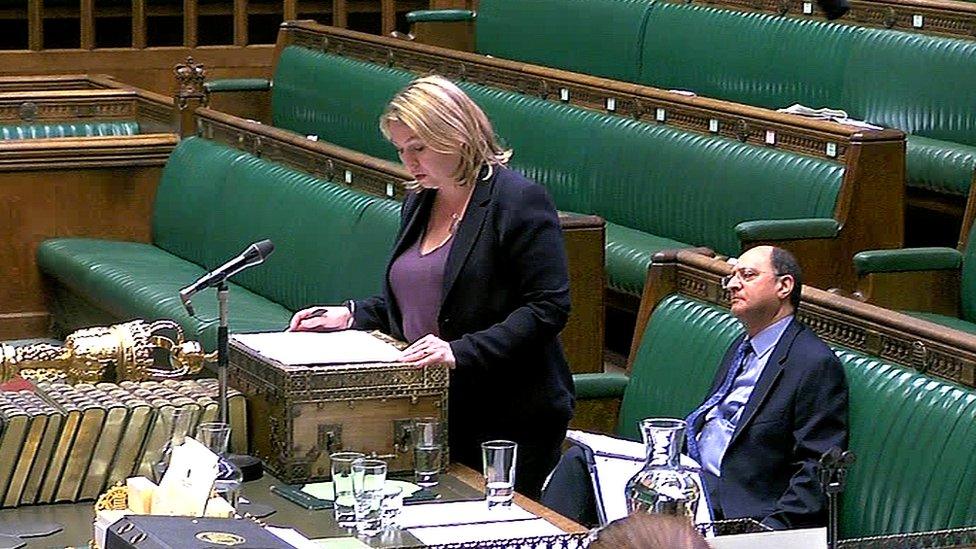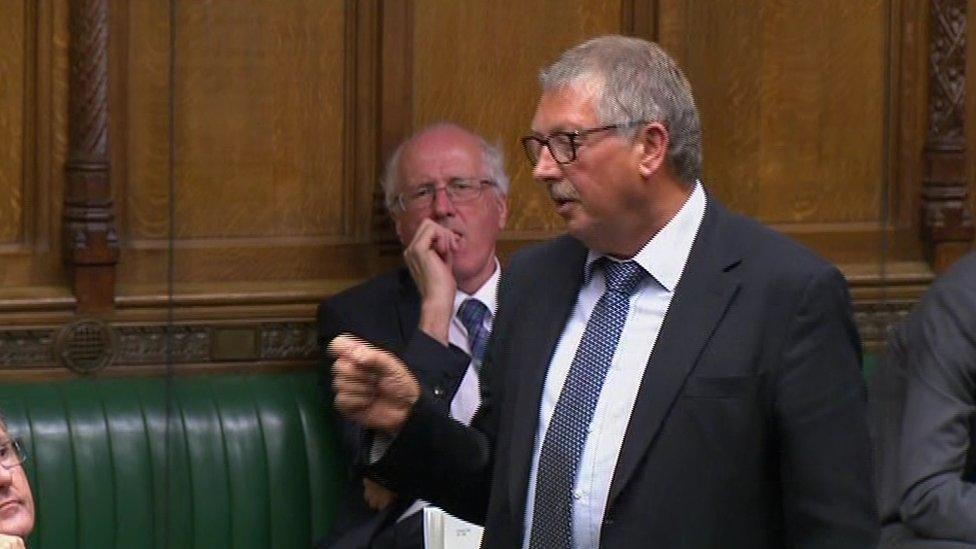Legacy amendment dropped as Northern Ireland budget passes
- Published

Secretary of State Karen Bradley said it was "deeply regrettable" that a functioning executive had not been restored
MPs have given the legal authority for money allocated in the Northern Ireland budget to be spent.
The Northern Ireland budget bill authorises spending for the region until March 2019.
It includes the £410m secured by the DUP in 2017 as part of its confidence and supply deal with the Conservative Party in 2017, external.
Former defence secretary Sir Michael Fallon put forward an amendment related to legacy issues during the debate.
It would have restricted financial resources for the prosecution of military veterans in connection with offences committed during the Troubles.
He later withdrew the amendment as he said it did not have the support of Northern Ireland MPs.
'Undermine the rule of law'
Sir Michael had the backing of more than 30 of his Conservative colleagues for his amendment.
But Northern Ireland Secretary Karen Bradley said if the proposal was passed it would undermine the rule of law and the independence of the prosecution service, as well as playing into the hands of those seeking to draw a moral equivalence between the security forces and paramilitaries.
While Sir Michael reluctantly withdrew his amendment, he said the argument for a statute of limitations would not go away
Northern Ireland has been without an executive since January 2017.
As a result the budget had to be signed off at Westminster. It will undergo further scrutiny in the Lords.
Speaking during the debate, Mrs Bradley said it was "deeply regrettable" that the government has tried, but failed, so far to restore a functioning executive.
"Passing this budget bill does not remove the pressing need to have locally accountable political leaders in place to take the fundamental decisions that will secure a more sustainable future for the people of Northern Ireland," she said.
Mrs Bradley added that the bill authorises Northern Ireland departments and other bodies to incur expenditure of up to £8.9bn and use resources of up to £9.9bn for the financial year ending 31 March 2019.
Shadow Northern Ireland secretary Tony Lloyd said it was important that a record was made of how the decisions were made for the budget.
He said "we do need some certainty" so that civil servants know what their capacity is in Northern Ireland.
"It may not yet be crisis, but crisis is beginning to emerge," he said, referencing the fact that planning decisions, permanent contracts for policemen and the NHS waiting list in Northern Ireland all need addressing.
Earlier in July the Court of Appeal ruled that many major decisions in Northern Ireland cannot be taken by civil servants in the absence of ministers.

Sammy Wilson said some allocations were based on decisions taken by the assembly nearly two and a half years ago
DUP MP Sammy Wilson said: "This is a difficult budget, in cash terms, it's a flat budget and the amount of money available to government departments in Northern Ireland is no different than it was in the previous year, and that does present challenges."
Mr Wilson added the challenges included allocations being based on decisions taken by the assembly nearly two-and-a-half years ago.
Meanwhile, Defence Secretary Gavin Williamson has announced that a team has been established in the Ministry of Defence to consider proposals to protect armed forces veterans from prosecution for historical allegations.
Mr Williamson told MPs he understands concerns over whether current and former personnel were receiving the legal protection they deserve, amid calls for a statute of limitations
- Published9 July 2018

- Published9 May 2018

- Published26 June 2018
